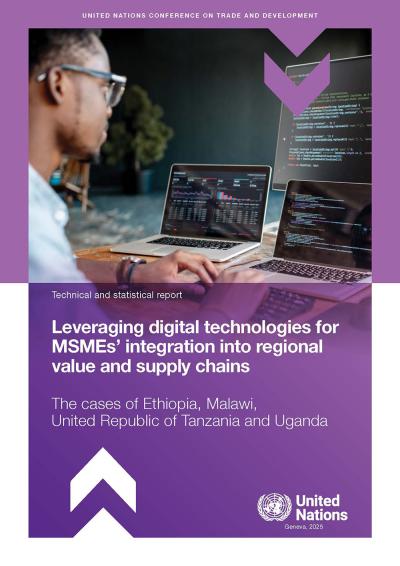
A robust and vibrant private sector drives inclusive and sustained economic growth. In Africa, the private sector holds immense potential to contribute directly to the Agenda 2030 Sustainable Development Goals (SDGs) and the African Union Agenda 2063 – the Africa We Want.
The private sector, especially micro, small and medium enterprises (MSMEs), dominates Africa's economy, accounting for over 80% of total production, two thirds of total investment and three fourths of total credit. It also employs about 90% of the working population.
Drawing on case studies from Ethiopia, Malawi, Tanzania and Uganda, it highlights the pivotal role of MSMEs in driving economic growth, employment and structural transformation, while underscoring the persistent barriers they face, including limited access to finance, weak integration into regional global value chains, low levels of digital adoption and widespread informality.
This report investigates how digital technologies and innovative financing can enable micro, small and medium-sized enterprises (MSMEs) in Africa to integrate more effectively into regional value and supply chains.
The African Continental Free Trade Area (AfCFTA) provides a historic opportunity to strengthen MSME participation in intra-African trade by reducing tariffs and non-tariff barriers, opening new market niches in manufacturing, agribusiness and services. However, for MSMEs to fully benefit from this opportunity, structural bottlenecks must be addressed.
Bridging the access to finance gap
Access to finance remains one of the most significant barriers for MSMEs across Africa, constraining their growth and export potential. Approximately 51% of small-scale enterprises report needing more financing than they can access, creating a total credit shortfall of about $300 billion. This financing gap helps explain why only 14% of African firms engaged in export activities in 2024.
The report demonstrates that digital transformation, through mobile money, e-commerce and digital trade facilitation tools, can enhance competitiveness and connectivity, while innovative financing models such as blended finance, supply chain finance and fintech solutions can bridge Africa's MSME financing gap.
Enhancing productivity and market access
Digital technologies and innovative finance mechanisms have the potential to enhance MSME productivity and market access. Uganda and Tanzania show strong advances in digitalization and blended finance initiatives, while Malawi emphasizes policy-driven MSME support. Ethiopia illustrates persistent financial exclusion and collateral barriers despite rising digital adoption. Across all four countries, MSMEs are increasingly positioned to benefit from AfCFTA integration if enabling conditions are strengthened.
Findings show that coordinated policies to expand digital infrastructure, improve financing access and strengthen trade facilitation are essential to unlocking MSME potential. By leveraging technology and finance, African MSMEs can move from the periphery of regional trade to central actors in driving inclusive and sustainable economic transformation across the continent.


